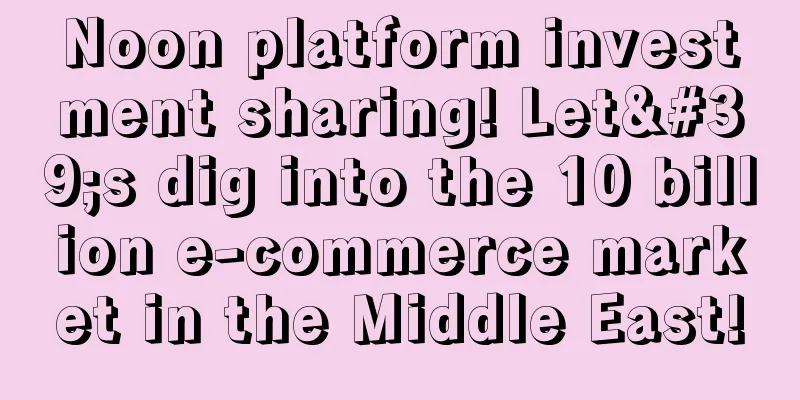Noon platform investment sharing! Let's dig into the 10 billion e-commerce market in the Middle East!

|
Noon is a joint venture between Emaar Properties chairman Mohamed Alabbar, Saudi Arabia's Public Investment Fund and Kuwaiti franchise company MH Alshaya. Saudi Arabia is one of the countries with the fastest development of online shopping, and it is also the largest and most potential market in the Middle East. Saudi Arabia is a battleground for cross-border e-commerce. In addition to a large number of new Chinese cross-border e-commerce forces, local e-commerce companies Noon and Souq also regard Saudi Arabia as one of their key markets. The Middle East Station is unmatched "Time", "Place" and "People" ✦ "Time": There are currently more than 20,000 sellers in the Middle East site, and the competition is relatively not that fierce. ✦ “ Geographical advantage”: local consumers are more receptive to higher-priced products; for sellers, higher profits can be obtained compared to other sites. ✦ " Harmony among People" : The Middle East's per capita GDP ranks among the highest in the world, and its overall purchasing power is strong. The UAE's per capita GDP is nearly US$70,000, which is about 7 times that of China's per capita GDP. 1. High profit: Compared with the 20% profit margin of European sites, the profit margin of Middle East sites is over 40%. The cost structure of the Middle East site is not much different from other sites: due to low VAT, low logistics costs, low FBA fees, and slightly higher product pricing compared to other sites, the profit margin on the Middle East site is higher than other sites 2. High conversion rate: Sellers can achieve more effective results by coordinating with Middle Eastern holidays, which can bring a 10-fold increase in sales. During important holidays unique to the Middle East, such as Ramadan and White Friday, all categories will participate in promotions. The strong festive atmosphere will naturally arouse a surge in shopping desire, and online traffic and consumption will also greatly increase. There is still a lot of room for sales growth at the Middle East site. 3. Huge market potential: The e-commerce market in the Middle East is developing rapidly and the e-commerce platform is very young, flexible in operation, and has many supporting preferential policies. Currently, there are relatively few e-commerce companies and little competition, so it has attracted the attention of many cross-border e-commerce sellers; compared with the mature European and American markets, the e-commerce market in the Middle East is just getting started: according to market reports, the total e-commerce market in 2020 will be US$4.15 billion, and it will reach US$4.9 billion in 2021. (Source: SellerGrowth ) |
>>: Request a recount! Trump lost two key states, and a large number of sellers cried!
Recommend
BigCommerce acquires BundleB2B! Further strengthens To B business
It is learned that on April 26, BigCommerce announ...
Big news of the week! Cross-border e-commerce export clothing category growth rate is 52%
Amazon removes more than a dozen products Amazon ...
Britain's largest port strikes, dozens of cargo ships affected! Losses amount to $800 million!
It is learned that according to foreign media repo...
An Amazon summoner with an interesting soul
What I want to share with you today is the practi...
What is Selling Manager? Selling Manager Review
Selling Manager is a free tool designed to help me...
Sales exceeded 97 billion US dollars! After Black Friday and Cyber Monday, the US e-commerce market is still hot!
According to the latest research from Salesforce, ...
What is Best Sellers? Best Sellers Review
Amazon generates the most popular products based o...
Big news! More than 53,000 US trademarks may be invalidated, and another service provider went bankrupt
Black Friday and Cyber Monday have just come to ...
Reviews are dead! Just now, Amazon officially announced...
On Christmas Eve, my brother-in-law came again wi...
The disparity in the world: A seller born in the 2000s has nearly 200,000 yuan in savings, but he sells his house to start Amazon?
There are a thousand Hamlets for a thousand reader...
8 free websites for selecting Amazon products
The editor has compiled 8 useful foreign websites...
What is Venmo? Venmo Review
Venmo is a small payment software that allows user...
Operations and stocking, management takes the blame? ! What algorithm can make the most reasonable use of funds?
Hello everyone, our company has its own factory, 1...
Will the “inventory crisis” in the US retail market continue until 2023?
Over the past two years, U.S. consumer demand for ...
What is Shop.com? Shop.com Review
Shop.com was originally just a product comparison ...









